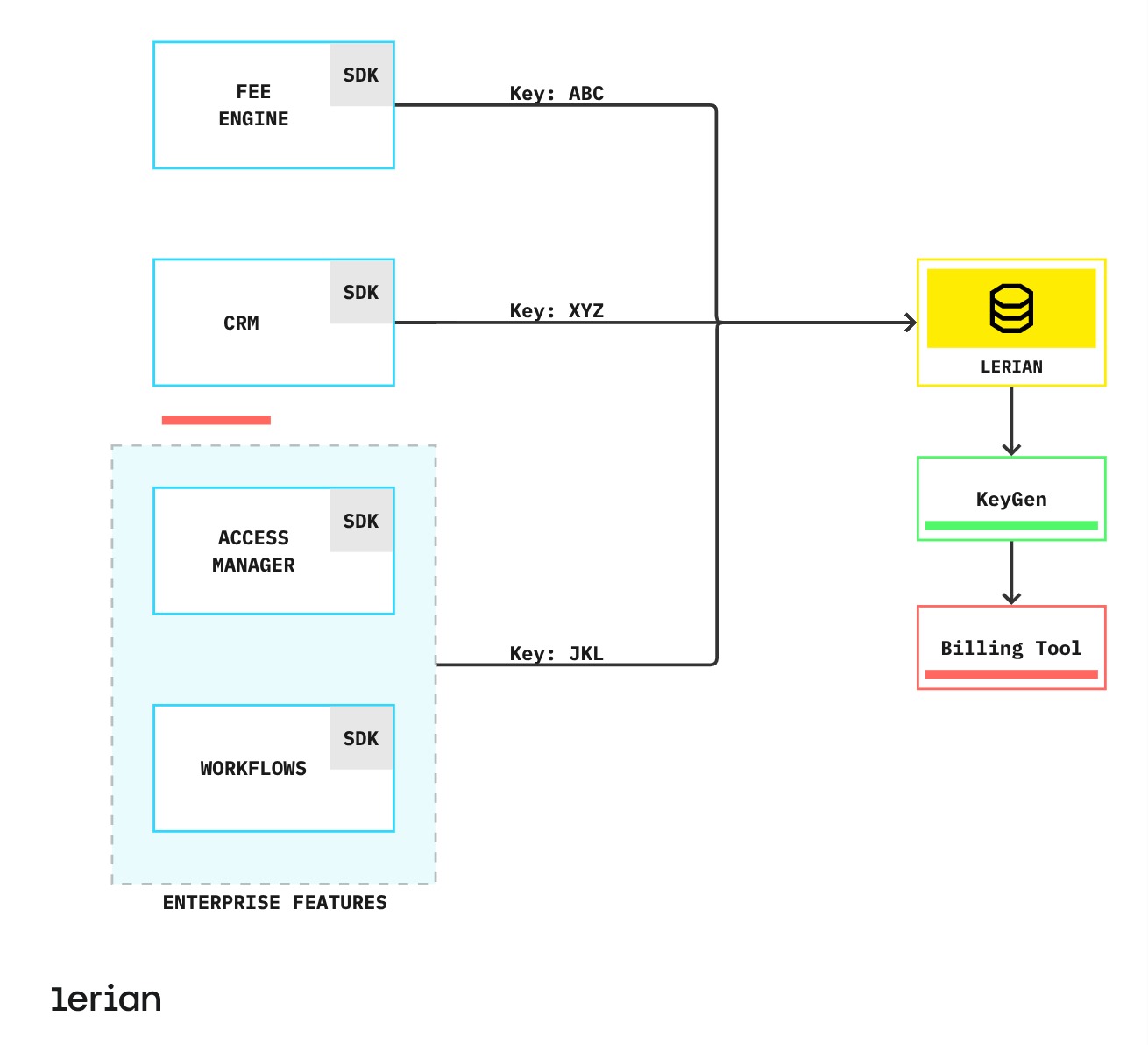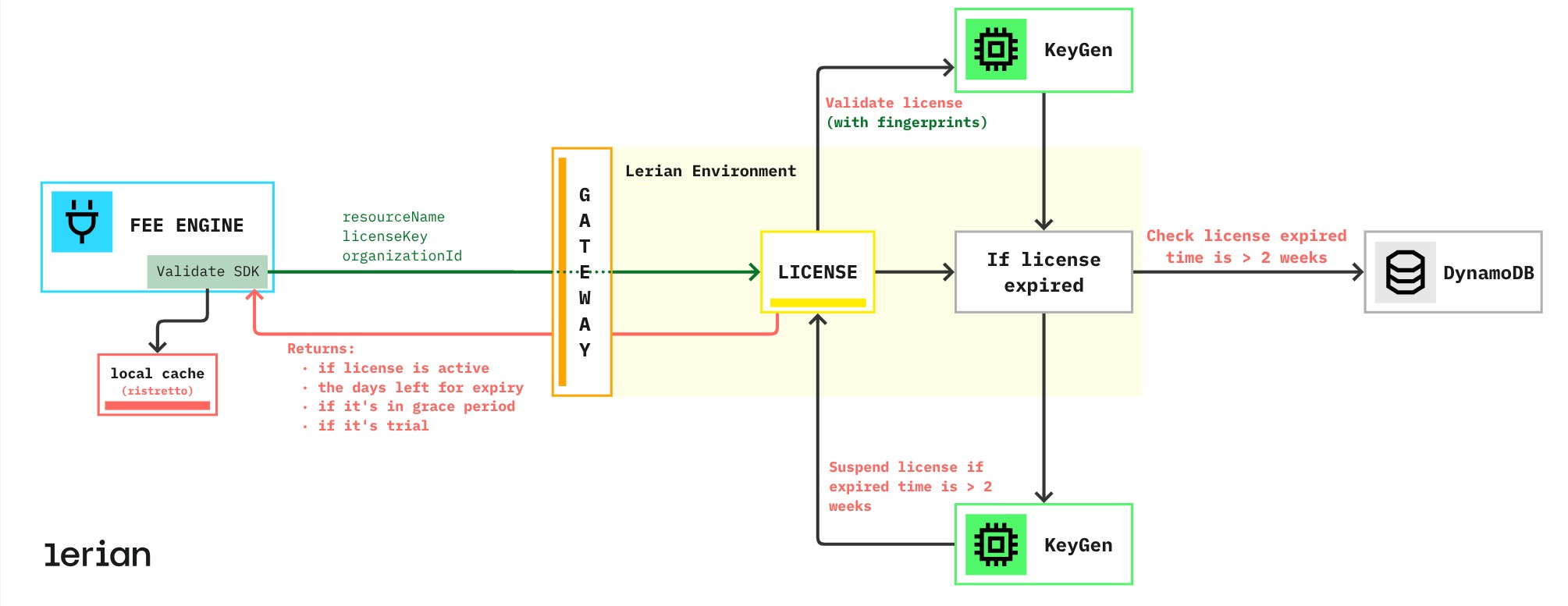License Manager
Our open-source Core is free to use. But when it comes to monetizing enterprise features and plugins, whether developed by Lerian or our partners, we rely on a licensing system to manage access.
Why licenses matter
Without licenses, we can’t ensure payment before usage, tailor access per customer, or scale support and commercial operations confidently.
Licensing helps us protect revenue, simplify operations, and ensure that customers get what they paid for; nothing less, nothing more.
How Lerian monetizes
Lerian's business model is modular. Each product line may require a license to unlock access:
| Revenue Line | Description |
|---|---|
| Support | Technical support + access to enterprise plugins as a bundle |
| Marketplace / Plugins | Individual plugin licenses, billed monthly. Includes Lerian-built and third-party plugins |
| Learning & Certification | Courses and certifications related to Midaz and its ecosystem |
| Professional Services | Custom consulting and project delivery |
NoteEnterprise features included in the Support plan are actually plugins — but licensed as a unified bundle instead of one by one.
Supported licensing scenarios
Your plugin must support all the following use cases:
| Scenario | Description |
|---|---|
| Community | OSS-only. No license required |
| Support only | One global license for Lerian enterprise features |
| Support + Lerian plugins | One global license + individual licenses per Lerian plugin |
| Support + third-party plugins | One global license + individual licenses per partner plugin |
| Support + mixed plugins | Combined setup: Lerian + partner licenses |
ImportantOur system must also support future SaaS models, allowing partners to license and distribute their own plugins independently.
How License Manager works
Powered by KeyGen
We use KeyGen to manage license keys and their lifecycle. It supports:
- License key generation
- Status control (active, expired, revoked)
- Periodic validation
- Integration with future billing workflows
Although we're currently using monthly billing cycles, our system is prepared for other intervals, such as biweekly, quarterly, or annual.
License validation flow
Every plugin or enterprise feature must regularly validate its license using the official SDK once a week.
NoteThe SDK handles caching, retry logic, and graceful degradation, so you don’t need to build that logic yourself.
Status outcomes
| Status | Behavior |
|---|---|
| ✅ Active license | Full access and client in good standing. |
| ⚠️ License expired | Continue access (2-week grace period) and show a warning. |
| ⛔ License revoked | Block access after the grace period until the license is restored |
Architecture
License validation overview

Each plugin uses the License SDK to check if the license provided by the client is valid. Here's what happens behind the scenes:
-
The SDK sends the license key and client info to Lerian's server.
-
Lerian checks the license status:
- Is it active?
- Is it expired, but still within a grace period?
- Has it been revoked?
-
The server replies with a response your plugin can use to allow, warn, or block access.
-
To improve performance, this result is stored in a local cache so it doesn’t need to check every time.
NoteWhat you need to do: Include the License SDK in your plugin. It will take care of validation and caching automatically.
How each plugin uses licensing

Every plugin or enterprise feature — whether developed by Lerian or a partner — uses the License SDK to validate its license.
- Each plugin has its own license key.
- The SDK checks the license by talking to Lerian’s licensing system.
- Lerian verifies that the license is valid using a secure backend (powered by KeyGen).
- In future versions, licenses will be automatically managed based on billing.
NoteWhat you need to do: Add the License SDK to your plugin and make sure it calls
validateLicense()before exposing any paid feature.
Benefits for partners
The License Manager is more than just a gatekeeper; it’s a foundation for scaling responsibly and sustainably.
Solves
- Unauthorized use of paid features
- Manual license tracking and revocation
- Legal and compliance risks
Enables
- Transparent monetization of partner plugins
- Flexible resale and bundling models
- Configurable licensing policies: trials, renewals, tolerance windows
ImportantFuture versions will integrate with our billing system to automate license revocation and renewal.
Updated 25 days ago
